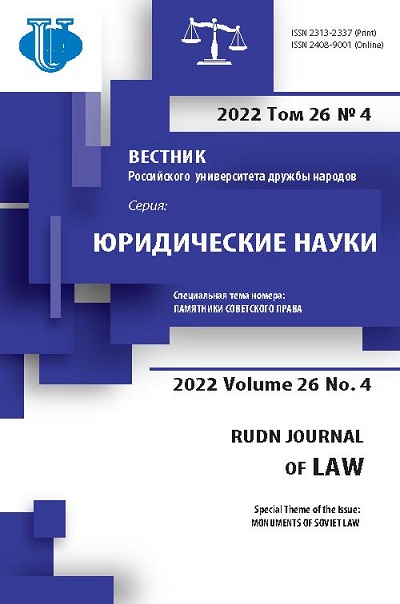The Civil Code of the RSFSR 1922: features of birth and happy fate
- Authors: Kuznetsov M.N.1
-
Affiliations:
- Peoples’ Friendship University of Russia (RUDN University)
- Issue: Vol 26, No 4 (2022): MONUMENTS OF SOVIET LAW
- Pages: 826-844
- Section: CIVIL AND LABOR LAW
- URL: https://journals.rudn.ru/law/article/view/32971
- DOI: https://doi.org/10.22363/2313-2337-2022-26-4-826-844
- ID: 32971
Cite item
Full Text
Abstract
Is dedicated to identifying conceptual legal problems related to the conditions and prospects of “revolutionary expediency” in the process of developing the provisions of the Civil Code of the RSFSR of 1922. The legal paradigm of that time was subjected to a profound transformation based on the ideas of “national property”, “class interest”, “Soviet power”, etc. Understanding the historical, socio-political and cultural processes allows to analyze the norms of the so-called proletarian law. It is established that the adoption of the Civil Code of 1922 was preceded by many years of titanic work of a huge number of highly professional pre-revolutionary lawyers who had drafted the Civil Code of Russia by 1914; later, the norms were lightly powdered with the class proletarian consciousness and taken as the basis (more than 400 of them in total) for the Civil Code of the RSFSR of 1922. The provisions of this code effectively operated until 1964, when the new Civil Code of the RSFSR was adopted. It was the code of “victorious socialism”, that have survived the abolition of the NEP (the New Economic Policy), industrialization and collectivization of the country, Constitution of 1936, Great Patriotic War and, finally, building of socialism in a single country. Thus, the adoption of the Civil Code of the RSFSR in 1922 became an epochal event in the life of the peoples of the multinational country, which, in terms of significance of its impact on Russian civilization and the entire world, can be compared with “Corpus iuris Romani”.
About the authors
Mikhail N. Kuznetsov
Peoples’ Friendship University of Russia (RUDN University)
Author for correspondence.
Email: kuznetsov-mn@rudn.ru
ORCID iD: 0000-0001-7229-1351
Doctor of Legal Sciences, Full Professor of the Department of Civil Law and Procedural Law and Private International Law, Law Institute, Honorary Worker of Higher Professional Education, Veteran of the RUDN University
6 Miklukho-Maklaya str., Moscow, 117198, Russian FederationReferences
- Berman, Ya. (1922) Marxism and the civil code. Sovetskoe pravo. (3), pp. 82-112. (in Russian).
- Dolinskaya, V.V. (2016) Development of the main provisions Civil Code: for example, the Civil Code of the RSFSR in 1922. Courier of Kutafin Moscow State Law University (MSAL). 10(26), 52-68. https://doi.org/10.17803/2311-5998.2016.26.10.052-068 (in Russian).
- Dudin, M.N., Frolova, E.E. & Kuznetsov, M.N., et al. (2016) Russia in Global Economy and International Relations: Economic Aspect of Social and Economic History of the 2nd Half of the 19th Century. International Journal of Economic Research. 13(9), 3803-3813.
- Dudin, M.N., Smirnov, W.V. & Rusakova, E.P. (2017) The Formation of Entrepreneurship in Russia: Historical Background and Modernity. Bylye Gody. 46 (4), 1174-1183. https://doi.org/10.13187/bg.2017.4.1174
- Goykhbarg, A.G. (1924) Fundamentals of private property law. Essays. Moscow, Krasnaya Nov' Publ. (in Russian).
- Gulyaev, A.M. (1924) The main provisions of the general part of the Civil Code and the subjects of law under the Civil Code. Technology, Economics and Law. Kyiv. (2), 43-52. (in Russian).
- Kursky, D.N. (1927) On the path of development of Soviet law. Moscow, Legal publishing house NKYu RSFSR. (in Russian).
- Lenin, V.I. (1970) On the tasks of the People's Commissariat of Justice in the conditions of the new economic policy. Letter to D.I. Kurskii. In: Full composition of writings. T. 44. Moscow, Politizdat Publ. (in Russian).
- Lenin, V.I. (1970-1982) Vladimir Ilyich Lenin: Biographical Chronicle. Moscow, Politizdat Publ. (in Russian).
- Makovsky, A.L. (1968) Development of the codification of civil legislation. In: Bratus S.N. (ed.). Development of the codification of Soviet legislation. Moscow, Yuridicheskaya literatura Publ. pp. 139. (in Russian).
- Makovsky, A.L. (2005) Civil law in the Soviet planned economy and in the market economy of Russia. Journal of Russian Law. 9 (105), 115-128. (in Russian).
- Maksimova, O.D. (2014) The role of D.I. Kursky in the formation of the ideas of Soviet law and in lawmaking. Pravovedenie. 4 (315), 225-236. (in Russian).
- Mamychev, A.U., Kim, A.A. & Frolova, E.E. (2020) “The Future” as an Attractor of modern political, legal and socio-economic transformations: an overview of the main problems and approaches. Advances in Law Studies. 8 (S5), 3-17. https://doi.org/10.29039/2409-5087-2020-8-5-3-17 (in Russian).
- Novitskaya, T.E. (2012) Civil Code of the RSFSR 1922. Moscow, Zertsalo-M. Publ. (in Russian).
- Ruzanova, V.D. (2016) Civil Code of the RSFSR of 1922: background of acceptance and continuity of legal regulation. Juridical journal of Samara University. 2 (2), 37-42. (in Russian).
- Shakhov, O.F., Shakhova, M.S. & Rusakova, E.P. et al. (2019) Development of Entrepreneurship During the Nep Years: Innovation, Forms, Technologies. International Journal of Recent Technology and Engineering. 2019. 8 (3), 7401-7405. https://doi.org/10.35940/ijrte.C6149.098319
- Shishkov, O.F. (1980) Guiding principles on the criminal law of the RSFSR in 1919 - a monument to Soviet criminal law thought. Pravovedenie. (3), 83-88. (in Russian).
- Stuchka, P.I. (1922) Notes on the class theory of law. Sovetskoe pravo. (3), pp. 17-18. (in Russian).
- Stuchka, P.I. (1924) The class state and civil law. Moscow, Sotsialisticheskaya akademiya Publ. (in Russian).
- Stuchka, P.I. (ed.). (1925) Encyclopedia of State and Law. Moscow, Kommunisticheskaya Akademiya Publ. (in Russian).
- Stuchka, P.I. (1928) The course of Soviet civil law. Introduction to Civil Law Theory. Moscow, Kommunisticheskaya Akademiya Publ. (in Russian).
- Stuchka, P.I. (1964) Marxist understanding of law. In: Selected works on the Marxist-Leninist theory of law. Riga, Latgosizdat Publ. (in Russian).
Supplementary files















